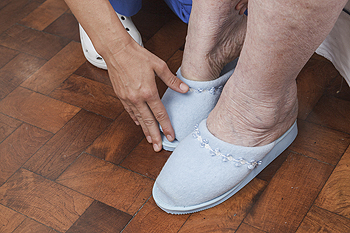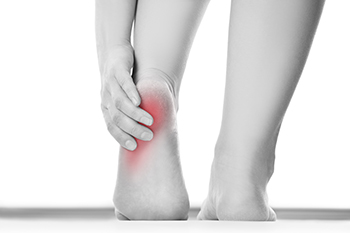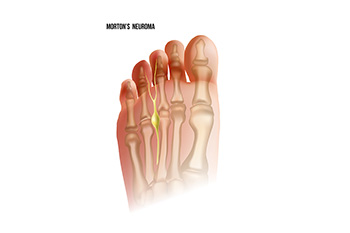Items filtered by date: September 2024
Causes and Prevention of Ankle Pain From Running

Ankle pain is a common issue among runners, often caused by several factors related to running dynamics. The pain can stem from overuse, wearing improper footwear, or poor running form. Repeated stress and impact during running can lead to inflammation of tendons or ligaments, resulting in discomfort. Wearing shoes that do not provide adequate support or cushioning may also contribute to ankle pain. To prevent these issues, choose an appropriate pair of running shoes designed for your foot type and running style. Strengthening exercises for the ankles and proper stretching can improve flexibility and stability. Additionally, incorporating rest days into your training routine allows your body to recover and reduce the risk of overuse injuries. If you have ankle pain from running, it is suggested that you visit a podiatrist who can treat it and offer additional running injury prevention methods.
All runners should take extra precaution when trying to avoid injury. If you have any concerns about your feet, contact Matthew McQuaid, DPM of Lake Mendocino Podiatry. Our doctor will treat your foot and ankle needs.
How to Prevent Running Injuries
There are a lot of mistakes a runner can make prior to a workout that can induce injury. A lot of athletes tend to overstretch before running, instead of saving those workouts for a post-run routine. Deep lunges and hand-to-toe hamstring pulls should be performed after a workout instead of during a warmup. Another common mistake is jumping into an intense routine before your body is physically prepared for it. You should try to ease your way into long-distance running instead of forcing yourself to rush into it.
More Tips for Preventing Injury
- Incorporate Strength Training into Workouts - This will help improve the body’s overall athleticism
- Improve and Maintain Your Flexibility – Stretching everyday will help improve overall performance
- “Warm Up” Before Running and “Cool Down” Afterward – A warm up of 5-10 minutes helps get rid of lactic acid in the muscles and prevents delayed muscle soreness
- Cross-Training is Crucial
- Wear Proper Running Shoes
- Have a Formal Gait Analysis – Poor biomechanics can easily cause injury
If you have any questions, please feel free to contact our offices located in Lakeport and Ukiah, CA . We offer the newest diagnostic and treatment technologies for all your foot care needs.
Arthritis Can Cause Pain in the Feet and Ankles
Common Foot Problems in Older Adults

Elderly people frequently encounter foot problems, such as plantar fasciitis, arthritis, gout, and claw toe. Plantar fasciitis, marked by heel pain and inflammation of the tissue along the bottom of the foot, can be particularly bothersome. Arthritis, including osteoarthritis and rheumatoid arthritis, often leads to joint pain, stiffness, and swelling, impacting overall mobility. Gout, another type of arthritis characterized by sudden, intense pain and swelling, usually affects the big toe due to uric acid crystal buildup. Additionally, claw toe, a condition where toes bend into a claw-like position, can result from muscle imbalances or arthritis. If you are older and are experiencing specific foot conditions, it is suggested that you make an appointment with a podiatrist who can provide you with relief and treatment solutions.
Proper foot care is something many older adults forget to consider. If you have any concerns about your feet and ankles, contact Matthew McQuaid, DPM from Lake Mendocino Podiatry. Our doctor can provide the care you need to keep you pain-free and on your feet.
The Elderly and Their Feet
As we age we start to notice many changes in our body, but the elder population may not notice them right away. Medical conditions may prevent the elderly to take notice of their foot health right away. Poor vision is a lead contributor to not taking action for the elderly.
Common Conditions
- Neuropathy – can reduce feeling in the feet and can hide many life-threatening medical conditions.
- Reduced flexibility – prevents the ability of proper toenail trimming, and foot cleaning. If left untreated, it may lead to further medical issues.
- Foot sores – amongst the older population can be serious before they are discovered. Some of the problematic conditions they may face are:
- Gouging toenails affecting nearby toe
- Shoes that don’t fit properly
- Pressure sores
- Loss of circulation in legs & feet
- Edema & swelling of feet and ankles
Susceptible Infections
Diabetes and poor circulation can cause general loss of sensitivity over the years, turning a simple cut into a serious issue.
If you have any questions please feel free to contact our offices located in Lakeport and Ukiah, CA . We offer the newest diagnostic and treatment technologies for all your foot and ankle needs.
Causes of Heel Pain

Heel pain can arise from a variety of causes, most often related to overuse, wearing improper footwear, or structural issues in the foot. Plantar fasciitis, which involves inflammation of the thick band of tissue that connects the heel bone to the toes, is the most frequent cause. Other possible causes of heel pain include Achilles tendonitis, stress fractures, or nerve entrapment like tarsal tunnel syndrome. Systemic conditions, such as arthritis or diabetes, can also contribute to heel pain, especially in older adults or those who are overweight. Regardless of the underlying cause, a podiatrist can diagnose the condition through a physical examination and imaging tests. Treatment options may include practicing specific exercises, custom orthotics, or in some cases surgery. If you have persistent or worsening heel pain, it is suggested that you schedule an appointment with a podiatrist to determine the cause and recommend appropriate treatment.
Many people suffer from bouts of heel pain. For more information, contact Matthew McQuaid, DPM of Lake Mendocino Podiatry. Our doctor can provide the care you need to keep you pain-free and on your feet.
Causes of Heel Pain
Heel pain is often associated with plantar fasciitis. The plantar fascia is a band of tissues that extends along the bottom of the foot. A rip or tear in this ligament can cause inflammation of the tissue.
Achilles tendonitis is another cause of heel pain. Inflammation of the Achilles tendon will cause pain from fractures and muscle tearing. Lack of flexibility is also another symptom.
Heel spurs are another cause of pain. When the tissues of the plantar fascia undergo a great deal of stress, it can lead to ligament separation from the heel bone, causing heel spurs.
Why Might Heel Pain Occur?
- Wearing ill-fitting shoes
- Wearing non-supportive shoes
- Weight change
- Excessive running
Treatments
Heel pain should be treated as soon as possible for immediate results. Keeping your feet in a stress-free environment will help. If you suffer from Achilles tendonitis or plantar fasciitis, applying ice will reduce the swelling. Stretching before an exercise like running will help the muscles. Using all these tips will help make heel pain a condition of the past.
If you have any questions please contact our offices located in Lakeport and Ukiah, CA . We offer the newest diagnostic and treatment technologies for all your foot and ankle needs.
Morton’s Neuroma Facts

Morton’s neuroma is a painful condition affecting the foot, typically caused by a thickening of the tissue around one of the nerves leading to the toes. This condition often develops between the third and fourth toes, where the nerve becomes compressed or irritated. Morton’s neuroma can be triggered by factors such as wearing tight or high-heeled shoes, which place excessive pressure on the foot, or by repetitive stress from activities like running or jumping. Symptoms can include sharp, burning pain in the ball of the foot, tingling or numbness in the toes, and a feeling of having a pebble in the shoe. These symptoms often worsen with activity and improve with rest. If you have pain in this area of your foot, it is suggested that you contact a podiatrist who can accurately diagnose and treat Morton’s neuroma.
Morton’s neuroma is a very uncomfortable condition to live with. If you think you have Morton’s neuroma, contact Matthew McQuaid, DPM of Lake Mendocino Podiatry. Our doctor will attend to all of your foot care needs and answer any of your related questions.
Morton’s Neuroma
Morton's neuroma is a painful foot condition that commonly affects the areas between the second and third or third and fourth toe, although other areas of the foot are also susceptible. Morton’s neuroma is caused by an inflamed nerve in the foot that is being squeezed and aggravated by surrounding bones.
What Increases the Chances of Having Morton’s Neuroma?
- Ill-fitting high heels or shoes that add pressure to the toe or foot
- Jogging, running or any sport that involves constant impact to the foot
- Flat feet, bunions, and any other foot deformities
Morton’s neuroma is a very treatable condition. Orthotics and shoe inserts can often be used to alleviate the pain on the forefront of the feet. In more severe cases, corticosteroids can also be prescribed. In order to figure out the best treatment for your neuroma, it’s recommended to seek the care of a podiatrist who can diagnose your condition and provide different treatment options.
If you have any questions, please feel free to contact our offices located in Lakeport and Ukiah, CA . We offer the newest diagnostic and treatment technologies for all your foot care needs.

